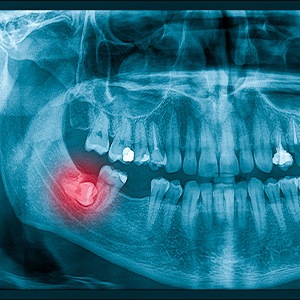Tooth Extractions – Attleboro, MA
Comfortable, Safe and Effective Tooth Removal

In most cases, the Capron Park Dental team will work hard to help patients maintain their flawless, healthy smiles and keep all of their natural teeth. Unfortunately, this can’t always be possible. When it’s necessary, we can also remove teeth to avoid damage, decay, impaction, or other concerns. If you want to learn more about Attleboro tooth extractions call Capron Park Dental to schedule an appointment in our state-of-the-art dental office. We will examine your smile and help you to determine whether or not tooth extractions from our Attleboro, MA dentist may be necessary.
Why Choose Capron Park Dental for Tooth Extractions?
- Advanced Soft Tissue Laser Technology
- In-House Dental Implant Placements Available
- Convenient Scheduling with Experienced Dentists
When are Tooth Extractions Recommended?

We may recommend tooth extractions in a number of situations, including:
- Severely decayed or damaged teeth that cannot support a restoration
- Primary (baby) teeth that don’t fall out on their own
- Teeth that are unable to erupt from the gums (impacted)
- To prepare a crowded smile for orthodontic treatment
- To ensure the longevity of a partial or full denture
- Third molars (wisdom teeth) are often removed due to lack of space in the smile
How are Teeth Removed?

We remove teeth in one of two ways. When a tooth has fully erupted from the gum line, we may be able to “pull” it. Pulling a tooth involves using a metal clasp to hold the dental structure. Then, we shift the tooth back and forth until they can be pulled free from the supportive bone and soft tissue. Surgical tooth extraction is necessary when a tooth is still fully or partially enclosed below the soft tissue. We may need to cut away soft tissue, drill into bone, or break the tooth into two or more pieces to ensure complete extraction.
Should I Use Sedation Dentistry?

At Capron Park Dental, we want our patients to be completely comfortable. While dental sedation isn’t right for everyone or every treatment, it can be beneficial for patients having one or more teeth removed. Sedation dentistry helps you to stay relaxed as we complete these often lengthy procedures. A sedative can also decrease pain receptors to ensure your complete comfort and freedom from pain.
What Happens After Tooth Extraction?

Following the removal of one or more damaged teeth, we will provide you with specific post-operative instructions tailored to your unique needs. You will likely experience bleeding, inflammation, and discomfort for the first 48 hours following your extraction. After the first few days, your empty socket should not be bleeding anymore, and the pain and inflammation should begin to diminish. You should consume only liquids for the first few days after treatment. Gradually add in soft foods until you feel comfortable returning to your regular diet. If your extraction site continues to bleed heavily or you notice an increase in pain or sensitivity to heat and cold, you should call us right away.
Understanding the Cost of Tooth Extractions

Tooth extractions of damaged teeth are often necessary to protect your healthy teeth from infection, crowding, impaction, or to prepare for dental implants. There are many factors that affect the cost of extraction, including the number of teeth in need of removal, the location of the tooth or teeth being removed, and any insurance coverage you may have. Here’s a more detailed explanation of the costs involved in your tooth extraction procedure.
Factors That Can Affect Tooth Extraction Cost

While it is difficult to determine the exact cost of your tooth extraction before our team can examine the tooth or teeth in question, there are numerous factors that may affect the total. These include:
- The type and location of the tooth or teeth needing removal, as well as the number of teeth needing to be extracted.
- The difficulty of the tooth extraction. Simple extractions and impacted extractions are very different procedures. Impacted extractions require your dentist to cut into tissue to get to the tooth. In some cases, a tooth may also need to be broken into several pieces to be removed.
- The next steps involved in the removal, such as if you will need a bridge or dental implant to replace it.
Does Dental Insurance Cover Tooth Extractions?

While individual dental insurance plans will vary, most plans typically cover around 50 percent of the cost of extraction after your deductible has been met. This includes wisdom teeth.
Be aware, however, that there may be limits in place on your policy that will only cover up to a certain number of teeth. You may also have a waiting period before your coverage kicks in. Every plan is different, but the team at Capron Park Dental will assist you in confirming your exact coverage with your insurance company.
Other Options for Making Tooth Extractions Affordable

In addition to dental insurance, Capron Park Dental offers other options to assist you in financing your tooth extraction. These include:
- Wisetack financing offers many options for patients looking to make affordable payments for dental care. You can apply for a plan by following the link on our page and get pre-approved with no impact to your credit score.
- Capron Park Dental’s membership plan provides discounted services for treatments performed in our office for a low monthly fee. There are three levels of care available, depending on your individual situation. Please visit our website for more information on what each plan provides.
At Capron Park Dental, we’re here to help you navigate your tooth extraction, including the cost and any questions you may have about the procedure and aftercare. Should you need any further information, please contact us at your earliest convenience and we’ll be happy to assist you.
Tooth Extractions FAQs
Does Getting a Tooth Extracted Hurt?
While it is normal to be anxious about potential pain caused by any dental treatment, your Capron Park Dental team will ensure that your mouth is numb before beginning your extraction.
It is common to experience some soreness and discomfort after this procedure, but following your aftercare instructions can make it a lot more manageable. These guidelines are essential to promoting healing, helping prevent infection and reducing swelling.
Should your pain worsen or if you notice signs of infection such as a fever, contact Capron Park Dental right away.
Is There an Alternative to a Tooth Extraction?
Whether there is an alternative to tooth extraction depends on the individual. While many options may be used to treat your specific problem, if the damage is too severe, your dentist will recommend the tooth be removed. Rest assured that at Capron Park Dental, our top priority is always to save your natural teeth; your dentist will only prescribe an extraction if it is absolutely necessary and there are no other viable alternatives.
Can I Leave the Space Empty After a Tooth Extraction?
If the tooth you’re having extracted is towards the back of your mouth, it can be easy to believe that you don’t need to replace it. After all, nobody will ever know it’s missing. But you use your teeth for so much more than just smiling. They are essential for chewing and properly enunciating, too. In fact, missing teeth can even cause you to develop a lisp.
Thus, it is important to replace any extracted teeth once you are done healing. Your dentist can discuss your options at your consultation and help you find a solution that works best for your lifestyle and budget.
Can I Smoke After Getting a Tooth Extracted?
Because tobacco products such as cigarettes, cigars, and “vapes” (e-cigarettes) can slow the healing process, it is important that you do not smoke immediately after a tooth extraction. You should wait at least five days following your procedure, but it is best to stop for two weeks if possible.
If you have struggled to quit in the past, speak to your dentist about your experience. We are not here to judge you; rather, we welcome the opportunity to help you prepare for this in advance of your treatment.

